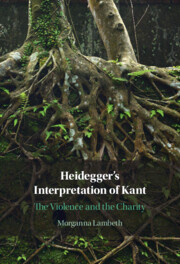Book contents
- Heidegger’s Interpretation of Kant
- Heidegger’s Interpretation of Kant
- Copyright page
- Dedication
- Contents
- Acknowledgments
- Abbreviations
- Introduction
- Chapter 1 The Two-Strand Method of Interpreting Kant
- Chapter 2 The Receptivity and Spontaneity of Cognition
- Chapter 3 A Common Root
- Chapter 4 The Metaphysical Deduction and Schematism
- Chapter 5 The Transcendental Deduction
- Chapter 6 The Form of Time and Self-Affection
- Conclusion
- Coda
- Bibliography
- Index
Chapter 4 - The Metaphysical Deduction and Schematism
Published online by Cambridge University Press: 01 June 2023
- Heidegger’s Interpretation of Kant
- Heidegger’s Interpretation of Kant
- Copyright page
- Dedication
- Contents
- Acknowledgments
- Abbreviations
- Introduction
- Chapter 1 The Two-Strand Method of Interpreting Kant
- Chapter 2 The Receptivity and Spontaneity of Cognition
- Chapter 3 A Common Root
- Chapter 4 The Metaphysical Deduction and Schematism
- Chapter 5 The Transcendental Deduction
- Chapter 6 The Form of Time and Self-Affection
- Conclusion
- Coda
- Bibliography
- Index
Summary
This chapter reconstructs Heidegger’s interpretation of Kant’s Metaphysical Deduction and Schematism. In Heidegger’s view, these two sections inquire into the source of the categories that human understanding possesses a priori. Heidegger’s reading of both sections exhibits a characteristic move of his interpretive method, where he sees an innovative line of argument prioritizing the imagination emerge from a more traditional setup. The reconstruction also reveals some variety in how one can apply Heidegger’s interpretive method to the different parts of a text. Heidegger suggests that the traditional strand of argument is more prominent in the Metaphysical Deduction; while Kant attempts to derive the categories from the atemporal logic of the understanding, his references to the faculty of imagination at certain critical junctures reveal the breakdown of those attempts. By contrast, the emerging, innovative line of argument is more prominent in the Schematism, which quickly surpasses its traditional framing in order to offer a phenomenologically compelling account of how the categories, as ways of interpreting time (as constant, unidirectional, and so forth), inform our perceptual experience.
- Type
- Chapter
- Information
- Heidegger's Interpretation of KantThe Violence and the Charity, pp. 104 - 132Publisher: Cambridge University PressPrint publication year: 2023

